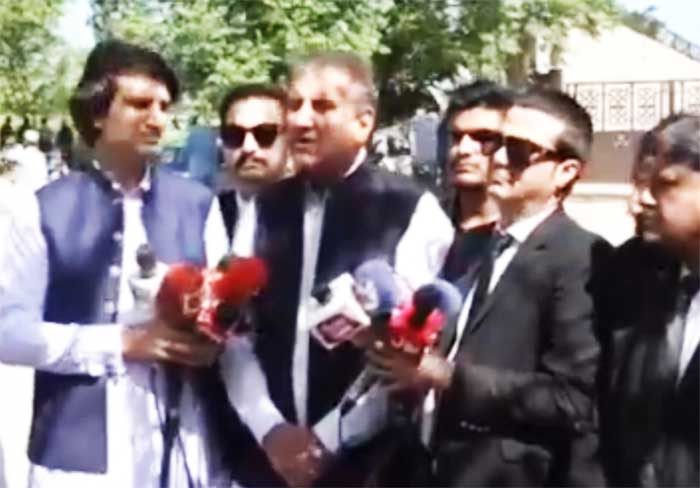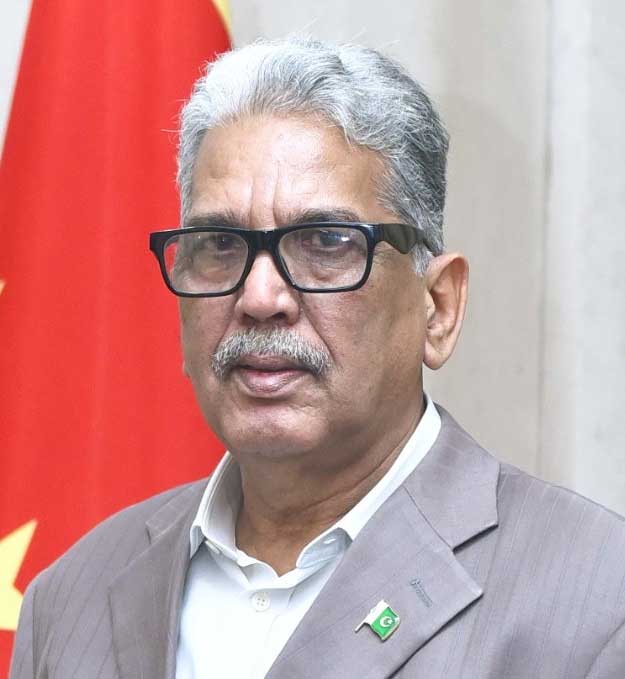Monitoring Desk
ISLAMABAD: Pakistan Tehreek-e-Insaf (PTI) vice-chairman Shah Mahmood Qureshi was presented before a special court, set up in Islamabad to hear cases pertaining to the Official Secrets Act from across the country, in the cypher case on Monday.
Judge Abul Hasnat Muhammad Zulqarnain of anti-terrorism court No. 1 has been appointed as the judge of the special court set up just earlier in the day.
The ATC confirmed that there will be a single court across the country to hear cases registered under the Official Secrets Act.
The hearing against Qureshi was heard in-camera by judge Zulqarnain. All unconcerned people were asked to leave the courtroom before the hearing started, and police officials stood guard outside it.
During today’s hearing, the court reserved its ruling on the Federal Investigation Agency’s (FIA) request to grant a 13-day physical remand of the PTI leader.
The former foreign minister was arrested two days ago minutes after he unequivocally conveyed in a news conference that party’s founding chairman Imran Khan was irreplaceable and that the party was united under his vision.
The FIA arrested Qureshi from his residence in the federal capital in the cypher leak case under the Official Secrets Act, 1923.
The arrest also came on the heels of the party stalwart confirming that the PTI leaders met roughly seven diplomats of different countries at a breakfast at the Australian High Commission the other day where Imran’s imprisonment, cypher controversy and other political issues were discussed.
The FIA is interrogating the incarcerated PTI chief and former premier in the case pertaining to the diplomatic cable that reportedly went missing from his custody and which he had for long presented as evidence of a “foreign conspiracy” to remove him as the prime minister.
According to the Official Secrets (Amendment) Bill 2023, a person will be guilty of an offense if he intentionally creates a problem of public order or acts against the state.
In addition, if a person attacks or damages a prohibited place and the purpose of this is to directly or indirectly benefit the enemy, then it is also punishable.
Under the said amendment bill, the accused will be tried in a special court and a decision will be taken after completing the hearing within 30 days.
President Dr Arif Alvi created a stir a day earlier (on Sunday) by claiming that he had not signed the Official Secrets (Amendment) Bill and the Pakistan Army (Amendment) Bill, attributing the confusion to his staff’s actions. This revelation plunged the country into a state of chaos.
In a social media post, the president vehemently denied giving his assent to the two bills. He admitted, however, that his staff failed to return the bills to parliament within the stipulated 10-day timeframe mandated by Article 75 of the Constitution. He accused his staff of not only deceiving him but also undermining his authority, effectively concealing the fact that the bills had not been returned.
Alvi said that he found out on Sunday that the bills had not been returned within the stipulated timeframe, adding that on his repeated enquiries from his staff he got the assurance every time that the bills were returned.
Shortly after, the caretaker government defended the enactment of the Official Secrets (Amendment) Bill, and the Pakistan Army (Amendment) Bill, saying that the bills became the law on maturity of the 10-day period for presidential assent.
Caretaker Law Minister Ahmad Irfan Aslam spoke at a joint news conference with Caretaker Information Minister Murtaza Solangi, shortly after President Alvi denied that he assented to the two important pieces of legislation.
“The president had the option to raise objections to the bills within the stipulated timeframe but he chose not to, leading to the automatic enactment of the bills into law,” Aslam told the news conference.
He stated that the Pakistan Army (Amendment) Bill was received by the Presidency on Aug 2, while the Official Secrets (Amendment) Bill reached the president on Aug 8.
“The president had only two choices [after receiving the bills]: approve the bills or send them back with objections. No third option exists, and if the bills are not returned, they become law automatically after 10 days,” he added.




